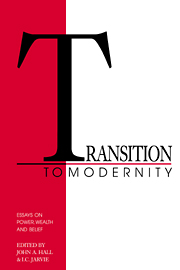Book contents
- Frontmatter
- Contents
- List of illustrations
- List of contributors
- Introduction
- PART I THE PRE-MODERN WORLD
- PART II TRANSITIONS TO THE MODERN WORLD
- PART III MODERNITY AND ITS DISCONTENTS
- 8 Science, politics, enchantment
- 9 Deconstructing post-modernism: Gellner and Crocodile Dundee
- 10 A methodology without presuppositions?
- 11 Gellner's positivism
- 12 Left versus Right in French political ideology
- 13 Property, justice and common good after socialism
- 14 Social contract, democracy and freedom
- 15 Thoughts on liberalisation
- 16 Peace, peace at last?
- Indexes
15 - Thoughts on liberalisation
Published online by Cambridge University Press: 02 February 2010
- Frontmatter
- Contents
- List of illustrations
- List of contributors
- Introduction
- PART I THE PRE-MODERN WORLD
- PART II TRANSITIONS TO THE MODERN WORLD
- PART III MODERNITY AND ITS DISCONTENTS
- 8 Science, politics, enchantment
- 9 Deconstructing post-modernism: Gellner and Crocodile Dundee
- 10 A methodology without presuppositions?
- 11 Gellner's positivism
- 12 Left versus Right in French political ideology
- 13 Property, justice and common good after socialism
- 14 Social contract, democracy and freedom
- 15 Thoughts on liberalisation
- 16 Peace, peace at last?
- Indexes
Summary
Liberty is generally established with difficulty in the midst of storms; it is perfected by civil discord; and its benefits cannot be appreciated until it is already old.
TocquevilleThe nineteen-eighties witnessed a dramatic increase in the pace of liberalisation across the world. The overall empirical picture is so complex as to support a conceptual proposal: going beyond liberalisation in its current, newspaper sense, tantamount to the adoption or restoration of political freedom, we could try to establish a twofold meaning, covering both the polity and the economy. Thus conceived, liberalisation would mean decentralisation in both spheres: devolution of powers, in the political realm; and decentralisation of decisions, in the economic system. Privatisation, which relates to ownership besides the decentralisation of economic decisions, might be considered a special case of economic liberalisation, since it tends to go along with ‘popular capitalism’, through the floating of shares in state enterprise.
The global picture also allows one to discern at least three big trends. First, there is the return of liberism, that is to say, of economic decentralisation, though obviously not in the form of Victorian laissez-faire. Laissez-faire seems ruled out if only because so much of modern economy (and technology) is predicated on huge and costly infrastructure requirements which the state alone can provide. However, the impossibility and undesirability of a ‘stateless’ economy by no means impairs the advantages of a decentralised structure of decisions concerning production, exchange and research; and its dirigiste opposite turned out to be dismally inefficient. South Korea is far from being a laissez-faire economy, yet its strong market element gives it an overwhelming superiority over its North Korean counterpart.
- Type
- Chapter
- Information
- Transition to ModernityEssays on Power, Wealth and Belief, pp. 317 - 342Publisher: Cambridge University PressPrint publication year: 1992
- 3
- Cited by



